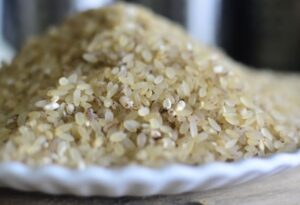Local Rice Prices Skyrocket by 137% in October – NBS Report
Local Rice Prices Skyrocket by 137% in October – NBS Report

The price of local rice in Nigeria surged by 137.32% in October 2024 compared to the same month in the previous year, placing it among the country’s top ten most expensive staple foods.
This significant increase was highlighted in the National Bureau of Statistics (NBS) Selected Food Prices Report for October 2024, which provided a detailed analysis of food price trends across the nation.
According to the NBS, the average cost of local rice in October 2024 was N1,944.64, a sharp rise from N819.42 in October 2023. The steep increase reflects ongoing inflationary pressures on food prices, which have become a critical issue for many Nigerian families grappling with the rising cost of living.
In addition to the year-on-year increase, the report noted a month-on-month rise of 1.56% in the price of local rice, which was N1,914.77 in September 2024. This reinforces the persistent inflationary trend within the country’s food sector.
There were also notable regional differences in rice prices across Nigeria. Kogi State recorded the highest price for local rice at N2,693.41, while Benue State had the lowest at N1,267.25. Similarly, Kogi’s price reached N3,187.35, while Niger reported the lowest price at N2,017.04.
The surge in rice prices is primarily attributed to challenges in the foreign exchange market, which have increased the cost of rice imports. Additionally, global rice prices have risen due to factors such as the ongoing Ukraine conflict and higher energy costs, further straining the market.
Despite an increase in local rice production, Nigeria’s reliance on imports to meet domestic demand for rice remains significant. This dependency, combined with the rise in global rice prices, has contributed to the higher costs of both local and imported rice.
The escalating prices of rice, including local varieties such as Ofada rice, are major drivers of food inflation in Nigeria.
Last month, Senator Babangida Husaini, representing Jigawa North-West, urged all levels of government to take urgent action to address the rising cost of essential food items, which continue to climb even as the harvest season progresses.
TRENDING SONGS
 Shock in Anambra: Bride Disappears Moments Before Wedding
Shock in Anambra: Bride Disappears Moments Before Wedding
 Nigerian Woman Returns ₦330 Million Accidentally Credited to Her Account
Nigerian Woman Returns ₦330 Million Accidentally Credited to Her Account
 APC Don Reach Morocco?’ VeryDarkMan Reacts to Seyi Tinubu Poster
APC Don Reach Morocco?’ VeryDarkMan Reacts to Seyi Tinubu Poster
 Bride Breaks Down in Tears as Wedding Meals Were Kept Secretly While Guests Go Home Hungry
Bride Breaks Down in Tears as Wedding Meals Were Kept Secretly While Guests Go Home Hungry
 Odogwu by Day, Robber by Night: How Marriage Joy Turned Into Tragedy
Odogwu by Day, Robber by Night: How Marriage Joy Turned Into Tragedy
 Nigerian Officials Allegedly Pocket N4–6B Weekly Through Smuggling Cartels at Seme–Badagry Border
Nigerian Officials Allegedly Pocket N4–6B Weekly Through Smuggling Cartels at Seme–Badagry Border
 Ahmad Yerima: Naval Officer to Face No Sanctions After Clash with Wike – Matawalle
Ahmad Yerima: Naval Officer to Face No Sanctions After Clash with Wike – Matawalle
 Trending Video: Muslim Man Joins Wife in Hallelujah Challenge ‘Dress Like Your Miracle’ Night
Trending Video: Muslim Man Joins Wife in Hallelujah Challenge ‘Dress Like Your Miracle’ Night
 Woman Seeks Advice as Late Brother’s Wife Refuses to Mourn Him Following His Death With Alleged Mistress
Woman Seeks Advice as Late Brother’s Wife Refuses to Mourn Him Following His Death With Alleged Mistress
 Nobody Cares About Fine Girls In The UK, I Miss Nigeria — Nigerian Lady Laments
Nobody Cares About Fine Girls In The UK, I Miss Nigeria — Nigerian Lady Laments
Share this post with your friends on ![]()













